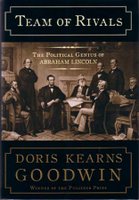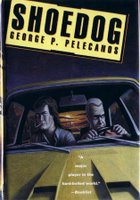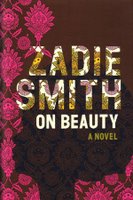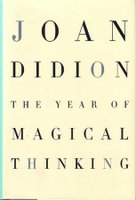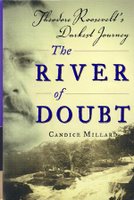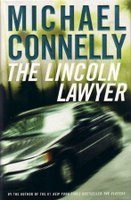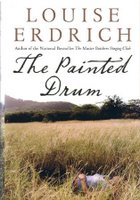21. Skeleton Man, Tony Hillerman. Mystery 3-7 241
22. Lincoln and Whitman, Daniel Mark Epstein. History 3-8 339
23. Fleshmarket Alley, Ian Rankin. Mystery 3-10 420
24. Saturday, Ian McEwan. Fiction 3-13 279
25. Snow, Orhan Pamuk. Fiction 3-19 426
26. The Forgotten Man, Robert Crais. Mystery 3-24 342
27. Men and Cartoons, Jonathan Lethem. Fiction 3-25 160
28. The Oregon Trail, David Dary. History 3-28 332
29. War Trash, Ha Jin. Fiction 3-29 350
30. Playing With Fire, Peter Robinson. Mystery 4-2 354
31. Strange Affair, Peter Robinson. Mystery 4-5 368
32. The Time Traveler’s Wife, Audrey Niffenegger. Fiction 4-10 536
33. Drama City, George Pelecanos. Fiction 4-12 291
34. Extremely Loud & Incredibly Close, Jonathan Safran Foer. Fiction 4-15 326
35. Mindscan, Robert Sawyer. Speculative Fiction 4-18 295
36. The Position, Meg Wolitzer. Fiction 4-21 307
37. The Sign of the Book, John Dunning. Mystery 4-24 353
38. Aloft, Chang-rae Lee. Fiction 4-27 343
39. Negro League Baseball, Neil Lanctot. Baseball 4-28 379
40. Ultramarathon Man, Dean Karnazes. Running 4-30 277
41. Singularity Sky, Charles Stross. Speculative Fiction 5-2 313
42. Garlic and Sapphires, Ruth Reichl. Auto-biography 5-4 328
43. Rules for Old Men Waiting, Peter Pouncey. Fiction 5-6 208
44. The Old Ball Game, Frank Deford. Baseball 5-9 224
45. The Seville Communion, Arturo Perez-Reverte. Mystery 5-11 375
46. The Geographer’s Library, Jon Fasman. Mystery 5-16 372
47. The Closers, Michael Connelly. Mystery 5-19 403
48. Bangkok Tattoo, John Burdett. Mystery 5-22 302
49. How To Be Alone, Jonathan Franzen. Essays 5-23 278
50. The Complete Western Stories of Elmore Leonard. Short Stories 5-23 528
51. Captain Alatriste, Arturo Perez-Reverte. Adventure 5-24 253
52. The Hot Kid, Elmore Leonard. Thriller 5-29 312
53. Wilt, 1962, Gary M. Pomerantz. Basketball 5-30 223
54. The History of Love, Nicole Krauss. Fiction 6-4 255
55. A Long Way Down, Nick Hornby. Fiction 6-7 256
56. North, Frederick Busch. Fiction. 6-10 302
57. Thomas Jefferson, Christopher Hitchens. Biography. 6-11 188
58. George Washington, Paul Johnson. Biography. 6-16 123
59. The Mysterious Flame of Queen Loana, Umberto Eco. Fiction 6-16 449
60. The Plot Against America, Philip Roth. Fiction 6-21 391
61. Specimen Days, Michael Cunningham. Fiction 6-23 305
62. The Diezmo, Rick Bass. Fiction 6-25 208
63. One Shot, Lee Child. Thriller 6-27 276
64. The Jane Austen Book Club, Karen Joy Fowler. Fiction 7-2 250
65. Native Tongue, Carl Hiaasen. Fiction 7-6 481
66. What We Talk About When We Talk About Love, Raymond Carver. Fiction 7-11 159
67. The Dante Club, Matthew Pearl. Fiction 7-15 367
68. A Good Scent From A Strange Mountain, Robert Olen Butler.
Fiction 7-17 249
69. The Colonel and Little Missie, Larry McMurtry. Fiction 7-19 229
70. The Polysyllabic Spree, Nick Hornby. Books on Books 7-22 140
71. The Accidental, Ali Smith. Fiction 7-25 306
72. No Country For Old Men, Cormac McCarthy. Fiction 7-27 306
73. The Big Over Easy, Jasper Fforde. Fiction 7-30 398
74. In Evil Hour, Garbriel Garcia Marquez. Fiction 8-1 183
75. The Dew Breaker, Edwidge Danticat. Fiction 8-3 242
76. Sunlight at Midnight, St. Petersburg and the Rise of Modern
Russia, W. Bruce Lincoln. History. 8-9 365
77. Absent Friends, S.J. Rozan. Mystery 8-10 367
78. Crusader’s Cross, James Lee Burke. Mystery 8-14 325
79. Benjamin Harrison, Charles W. Calhoun. Biography 8-14 166
80. Accelerando, Charles Stross. Speculative Fiction 8-21 390
81. The Summer He Didn’t Die, Jim Harrison. Fiction 8-24 277
82. Kremlin Rising, Vladimir Putin’s Russia and the End of Revolution, Peter Baker and Susan Glasser. Current Events 8-25 382
83. Soul Circus, George Pelecanos. Thriller 8-28 341
84. Crossworld, Marc Romano. Non-Fiction 8-30 225
85. In A Dry Season, Peter Robinson. Mystery 8-31 420
86. Finding Moon, Tony Hillerman. Fiction 9-3 319
87. The Wailing Wind, Tony Hillerman. Mystery 9-5 232
88. Tell No One, Harlan Coben. Mystery 9-7 339
89. 1776, David McCullough. History 9-10 294
90. A Memory of War, Frederick Busch. Fiction 9-16 352
91. American Scoundrel, The Life of the Notorious Civil War General Dan Sickles, Thomas Keneally. Biography 9-20 356
92. Gifts, Ursula K. LeGuin. Fiction 9-20 274
93. Brotherly Love, Pete Dexter. Fiction 9-23 274
94. A Dangerous Friend, Ward Just. Fiction 9-27 256
95. James Monroe, Gary Hart. Biography 10-2 150
96. On Beauty, Zadie Smith. Fiction 10-3 443
97. The March, E.L. Doctorow. Fiction 10-7 363
98. Arthur & George, Julian Barnes. Fiction 10-11 360
99. Dr. Seuss & Mr. Geisel, Judith and Neil Morgan. Biography 10-17 293
100. The Lincoln Lawyer, Michael Connelly. Thriller 10-17 404
101. The Year of Magical Thinking, Joan Didion. Memoir 10-19 227
102. Veronica, Mary Gaitskill. Fiction 10-21 227
103. Tribeca Blues, Jim Fusilli. Mystery 10-22 273
104. Trance, Christopher Sorrentino. Fiction 10-28 513
105. Flush, Carl Hiaasen. Fiction 10-29 263
106. Beethoven, Edmund Morris. Biography 11-2 229
107. Holy Skirts, Rene Steinke. Fiction 11-4 358
108. Cinnamon Kiss, Walter Mosley. Fiction 11-5 312
109. Caravaggio, Francine Prose. Biography 11-6 146
110. Europe Central, William T. Vollmann. Fiction 11-16 752
111. The Sinister Pig, Tony Hillerman. Fiction 11-18 228
112. Anansi Boys, Neil Gaiman. Speculative Fiction 11-22 334
113. The River of Doubt, Candice Millard. Biography 11-26 353
114. Leave Me Alone, I’m Reading, Maureen Corrigan. Books on Books 11-30 184
115. The Painted Drum, Louise Erdrich. Fiction 12-2 276
116. Memories of My Melancholy Whores, Gabriel Garcia Marquez. Fiction 12-4 115
117. The Education of a Coach, David Halberstam. Sports/ Biography 12-5 272
118. The Lighthouse, P.D. James. Mystery 12-9 323
119. Never Let Me Go, Kazuo Ishiguro. Fiction 12-13 288
120. Andrew Jackson, H.W. Brands. Biography 12-18 560
121. Garnethill, Denise Mina. Mystery 12-18 349
122. Tooth and Claw, T.C. Boyle. Short Stories 12-20 284
123. Love Medicine, Louise Erdrich. Fiction 12-26 272
124. The Making of an Ink-Stained Wretch, Jules Witcover. Biography. 12-28 332
125. A Firing Offense, George Pelecanos. Mystery 12-29 216
126. Nick’s Trip, George Pelecanos. Mystery 12-31 276
127. Given, Wendell Berry. Poetry 12-31 147
 Book 8 of 2006: Teacher Man, Frank McCourt. Memoir, 1-28, pp. 258.
Book 8 of 2006: Teacher Man, Frank McCourt. Memoir, 1-28, pp. 258.



